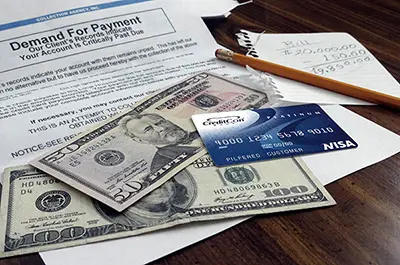Wage garnishment happens when an employer is required to pay part of an employee’s earnings directly to a creditor to which the employee (“garnishee”) owes an overdue debt. Generally, unless the debt is related to delinquent taxes or a federally-backed student loan, the garnishment order is issued by a court. No matter the type of debt, the creditor is required to make attempts to collect the debt from the employee before resorting to garnishment of wages, so it’s rare that a garnishment would be entirely unexpected.
First – it’s far easier to prevent wage garnishment than it is to stop it. If you’re being contacted by a creditor and are unable to pay the debt in full, it’s best to arrange a payment plan or discuss a settlement. Most creditors would rather pursue one of these options than to have to implement a wage garnishment, and will be willing to work with you. But if you’re already in the unfortunate position of having your wages garnished, there are a few things that you can do. Do keep in mind that your employer is required by law to comply with the garnishment order, so there’s no use in attempting to negotiate with them.
If you’re able to pay off the debt, this is by far the easiest and quickest way to stop a wage garnishment. However, if that’s not an option, the creditor may agree to an installment plan even after the garnishment is in effect. If your wages are being garnished it’s best to immediately contact the creditor to discuss this.

Although there are limits on the percentage of your wages that can be garnished (which vary depending on the type of debt, and by state law,) if you can show that the legally-allowed amount causes significant hardship, you may be able to get the garnishment reduced or eliminated. In order to successfully argue a hardship exemption, you’ll need to provide proof that, should the garnishment continue at its current amount, it will almost-inevitably lead to foreclosure, eviction, or another drastic action. To pursue this, you’ll need to obtain a “Claim of Exemption” form from the court that issued the garnishment order, and a hearing will then take place.
In most cases, filing for Chapter 7 bankruptcy will immediately stop a wage garnishment. However, this should not be done in haste, as it will have a long-term affect on your ability to obtain credit (such as mortgages and car loans,) and may not result in the complete release of all of your debt. A bankruptcy attorney should be consulted if you’re considering this option.
Quitting your job will stop the wage garnishment. However, again, this should not be a first-line defense, as (unless the debt is paid,) the garnishor will simply obtain a new garnishment order for any new employer.
Last, if the garnishment is related to delinquent income taxes, it could be helpful to have an experienced tax attorney review your prior year’s taxes. There may be exemptions that were missed or other errors that reduce or eliminate the amount owed. Additionally, the IRS is often willing to consider an “Offer in Compromise,” where you’ll pay them less than the full amount owed, which will then stop the wage garnishment.
Resources:
www.dol.gov/compliance/guide/garnish.htm
